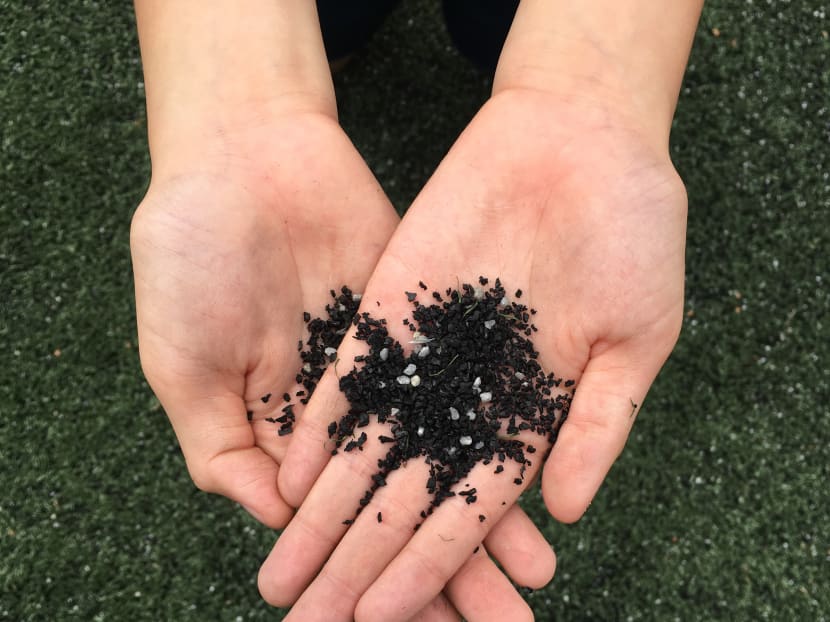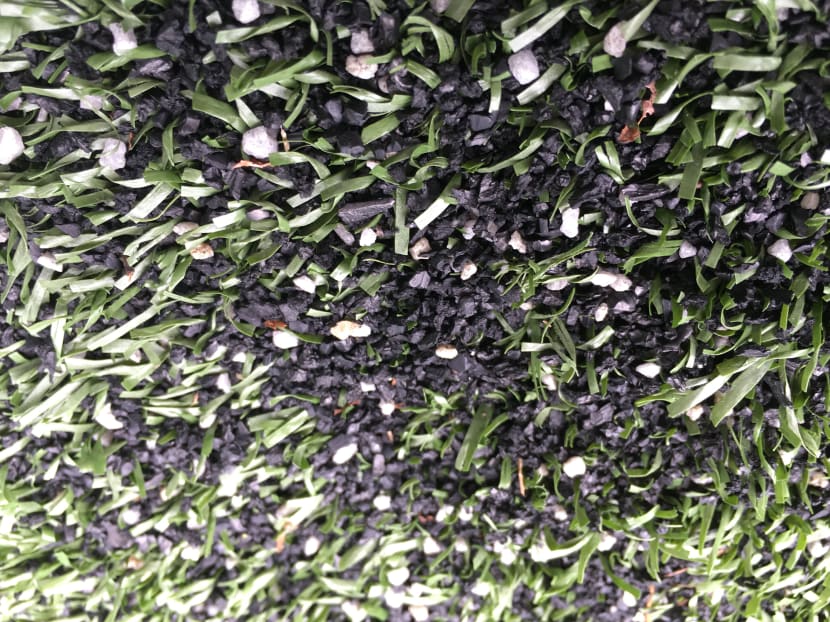MOE monitors synthetic pitch situation after study raises health fears
SINGAPORE — Synthetic football pitches in Singapore are coming under scrutiny due to concerns over the carcinogenic properties of rubber crumb used as infills of such surfaces, with the Ministry of Education (MOE) saying it is monitoring the situation and exploring alternatives.

Sport Singapore (SportSG) has declared that artificial football pitches are safe to play on, having studied reports that concluded the toxicity levels from the rubber crumb material from the infill are within permissible standards. Photo: Stanley Ho/TODAY
SINGAPORE — Synthetic football pitches in Singapore are coming under scrutiny due to concerns over the carcinogenic properties of rubber crumb used as infills of such surfaces, with the Ministry of Education (MOE) saying it is monitoring the situation and exploring alternatives.
The MOE was responding to reports in Europe after world football body Fifa urged an investigation into a flawed Dutch research in 2006 that had declared rubber crumb to be safe.
Rubber crumb — little black pellets found on artificial turf — is made from recycled and ground-down car tyres. It has long been suspected of containing harmful chemicals called PAHs (Polycyclic Aromatic Hydrocarbons) which are known to be highly carcinogenic, especially to children. But years of research and testing have failed to produce conclusive scientific evidence proving that it causes health risks.
There are an estimated 200 artificial turfs of varying sizes in Singapore — of which 140 are in schools. They are preferred to natural grass pitches as they are relatively easier to maintain and can withstand long periods of usage without damaging the surface.
An MOE spokesman told TODAY the schools’ synthetic fields are based on Fifa’s requirements on specification and safety standards, which are applied internationally.
“MOE is aware of the health concerns, which have been inconclusive at this stage. Nonetheless, MOE will continue to monitor developments and explore alternatives, in consultation with Sport Singapore, and make changes, where appropriate,” the spokesman said.
Local sports governing body Sport Singapore (SportSG) has declared artificial football pitches safe to play on, having studied reports that concluded the toxicity levels from the rubber crumb material from the infill are within “permissible standards”.
“Sport Singapore has been following the media reports on incidences of health concerns of players on the use of artificial pitches,” said a SportSG spokesman. “We have studied reports from leading authorities in the US and in Europe, including the US Consumer Product Safety Commission and the Norwegian Institute of Public Health. These reports had found the VOC (volatile organic compound) toxicity level from the rubber granules of artificial turf to be within permissible standards.”
A Football Association of Singapore (FAS) spokesman told TODAY the artificial pitch at its Jalan Besar Stadium headquarters utilises natural coconut husk and recycled cork for its infill, and not rubber crumb.
Laid at a cost of US$1 million (S$1.4 million) in 2006, the Jalan Besar field was re-laid two years later with a higher-quality replacement at a cost of US$400,000. The Jalan Besar pitch hosts S.League matches regularly on top of several other activities.
When asked if the FAS will replace its artificial turf with natural grass as a precaution, the FAS spokesman said: “We have written to Fifa on this matter and we will await their advice on the next course of action.”
Since news of the flawed 2006 Dutch research emerged, football clubs in the Netherlands are taking no chances. Last week, through a letter addressed to all parents of their youth academy, Dutch football giants Ajax Amsterdam reassured them that their children will not play on such artificial pitches again and these pitches will be removed completely from their academy premises.
Fifa president Gianni Infantino then urged an investigation into the issue, and admitted he would rather invest the US$4 billion set aside for football development over the next 10 years — where Fifa funds national associations’ construction of training facilities — on installing natural surfaces. Since 1998, Fifa has funded more than 700 pitches — mostly artificial — for its affiliates around the world.
When asked to elaborate on Infantino’s comments, a Fifa spokesman told TODAY: “Fifa’s Medical Assessment and Research Center (F-MARC), in cooperation with UEFA, conducted an analysis of this matter in 2006. At the time, the conclusion was: The available body of scientific research on this issue did not substantiate the assumption that cancer resulting from exposure to granulate infills in artificial turf could potentially occur. Since then, several independent researches have been conducted — the latest being from 2015 — reaching similar conclusions. Fifa will continue monitoring and analysing any new evidence produced on this matter.”
Local pitch operators TODAY spoke to said they are aware of the reports linking rubber crumb to cancer.
“We will continue to pay close attention for any future developments on this subject,” said a spokesperson for the Rainforest Sports Hub at Turf Club Road, who owns eight synthetic outdoor pitches. “On our end, we ensure that our pitches are of a high quality and are well-maintained.”
Sanjay Danani, director of The Cage which has 12 synthetic Fifa-approved pitches of varying sizes at Turf City and Kallang, said his company has “always adopted best practices in the choosing of our pitches, and materials used for their installation”.
Parents TODAY spoke to are concerned at the development. Edmund Goh, whose 10-year-old son trains and plays on artificial pitches at least four times a week, said: “We hope the relevant authorities can look into it. If the rubber infills are really harmful, our children’s health and well-being are at stake.”
Another parent, John Ho, said: “While we’re worried, there is little alternative as most training grounds and competition venues my son goes to are synthetic pitches. There are simply not enough natural pitches in Singapore.”
Social footballer Kevin Varghese Tomy, 22, a university student, said the development will not stop him from playing football on artificial pitches. “As of now, there aren’t any concrete studies or results to determine if it is cancer-causing so I’m not worried. Maybe in future if there are further developments, then I’ll reconsider,” he said.
ADDITIONAL REPORTING BY GERARD WONG & NOAH TAN

WHAT IS RUBBER CRUMB?
- It is a common base material - also called infill - of an artificial pitch. The black rubber pellets are scattered in between the synthetic fibres during the installation process.
- It is usually produced from grinding used car tyres, and is often mixed with other materials, including plastic pellets, sand, and rubber-coated sand. A combination of sand and rubber crumb is commonly used.
- Rubber crumb has long been suspected of containing harmful chemicals called Polycyclic Aromatic Hydrocarbons (PAHs), which are known to be highly carcinogenic - cancer-causing - especially to children.
- PAHs is a group of more than 100 different chemicals that are released from burning coal, oil, petrol, trash, tobacco, wood, or other organic substances such as charcoal-broiled meat.
- However, various studies have failed to prove conclusively that the rubber crumb can cause cancer.
- In 2014, Ms Amy Griffin, associate head coach for the University of Washington’s women’s soccer team discovered “a stream of kids” that have played on artificial turf and soon gotten cancer. She compiled a list of 38 American soccer players – 34 of them goalkeepers – who have been diagnosed with cancer. Blood cancers like lymphoma and leukemia dominate the list.
- In the latest study carried out in the United Kingdom in March this year, a professor at the University of Stirling claimed he has identified cancer-causing chemicals in crumb samples from artificial football fields. Professor Andrew Watterson, an environmental health expert, was quoted by Forbes as saying: “This report confirms and reveals the presence of a number of carcinogens at various levels in the rubber crumb.” His research has not been verified.






